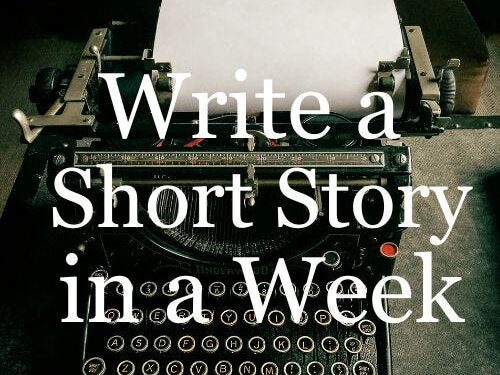Table of Contents
ToggleIntroduction
How To Write Your First Short Story In A Week By definition, a short tale is a brief fictional work that usually concentrates on a single occurrence or theme. It is intended to elicit a rapid, strong emotional reaction from the reader and frequently focuses on one or two individuals.
A short story is the ideal genre for novice authors or those who wish to try their hand at storytelling without committing to a lengthy project because it is focused and brief, unlike novels, which can be hundreds of pages long.
A brief story’s simplicity is what makes it so beautiful. While developing crucial writing abilities like character development, plot organization, and emotional resonance, it enables the writer to delve into a specific concept or point in time.
How To Write Your First Short Story In A Week The objective is to construct a comprehensive narrative that encapsulates your idea and effectively conveys it to your audience, not to produce a multi-layered, intricate work of art in the allotted week.
Day 1: Brainstorming and Planning Your Story
Step 1: Brainstorm Ideas
How To Write Your First Short Story In A Week The first step in writing your short story is to gather your thoughts and choose an idea that excites you. Your inspiration could come from anywhere—something you’ve experienced, a scene from a dream, an intriguing article you read, or even a “what if” scenario.
Think about the type of story you’d like to tell. Do you want to explore a dramatic moment, a slice of life, or a quirky situation? Here are a few prompts to help you get started:
- What if a person woke up one day and found they had no memory of their past life?
- What if a character made a life-altering decision based on a chance encounter?
- What if a simple object—a letter, a photograph—held the key to someone’s future?
Read More
Step 2: Define the Core Idea
How To Write Your First Short Story In A Week Once you’ve chosen your story idea, it’s time to refine it. A short story needs to have a focused concept, so narrow down your idea to one central theme.
This will guide your writing process and keep your story from becoming too meandering. Think about the emotions you want to evoke and the message or question you want to explore.
Step 3: Outline the Plot
Before jumping into writing, it’s helpful to outline your story’s structure. A common structure for short stories is the three-act structure:
- Act 1: The introduction, where the setting and characters are established, and the central conflict is introduced.
- Act 2: The rising action, where the protagonist faces challenges and struggles with the central conflict.
- Act 3: The resolution, where the conflict reaches its climax and is resolved in a satisfying way.
With this structure in mind, sketch a rough outline of how your story will unfold. Consider the key turning points and emotional beats of the story, so you can maintain momentum as you write.
Step 4: Create Your Characters
How To Write Your First Short Story In A Week Develop your characters, especially the protagonist, who should drive the story forward. Think about their motivations, desires, and conflicts. The more well-rounded your characters are, the more invested your readers will become in their journey.
You don’t need to create an elaborate backstory, but you should have a clear sense of who they are, what they want, and what stands in their way.

Day 2: Start Writing the First Draft
Now that you have your idea and outline, it’s time to start writing your first draft. Remember, this is just the beginning, so don’t worry about perfection—focus on getting your ideas down on paper.
Step 1: Set a Writing Goal
How To Write Your First Short Story In A Week To avoid getting stuck, set a specific writing goal for the day. It might be 500 words, or perhaps 1,000 words—whatever feels like a manageable challenge for you. The key is consistency. Try to write in a distraction-free environment, even if it means turning off your phone or using writing tools like Scrivener or Google Docs.
Step 2: Write Without Editing
One of the biggest hurdles in writing is the temptation to edit as you go. While editing is an essential part of the writing process, it can slow down your progress if you do it too early. Instead, focus on writing your first draft without worrying about mistakes. Just let the words flow and trust that you’ll fix things in later drafts.
Day 3: Continue Writing and Push Through
How To Write Your First Short Story In A Week At this point, your first draft should be taking shape. The key to finishing your story is to keep pushing forward—even if you’re starting to doubt yourself or the direction of your story.
Writing a short story in one week requires momentum, so keep your eyes on the prize and write at least one more section of your story.
Step 1: Focus on Progress
On day three, continue writing. Even if you feel unsure about certain parts of the story, just keep writing. Writing is a process, and the first draft will always need work. Keep going, and trust that things will improve with revision.
Step 2: Avoid Perfectionism
If you find yourself obsessing over details or word choice, remind yourself that this is just the draft. The goal is to finish a complete version of your story that you can later revise. Perfectionism can stop you from making progress, so aim for completion rather than perfection.
Day 4: Take a Break and Review Your Progress
How To Write Your First Short Story In A Week It’s important to take a break after writing a large chunk of your story. This distance will allow you to return with fresh eyes, helping you see areas that need improvement.
Step 1: Read What You’ve Written
On day four, take some time to read over the story you’ve written so far. As you read, ask yourself questions such as:
- Does the plot make sense?
- Are the characters’ motivations clear?
- Is the pacing appropriate?
You don’t need to make major revisions at this stage, but note areas that need attention.
Day 5: Revise the First Half
How To Write Your First Short Story In A Week Now that you’ve reviewed your story, it’s time to begin revising the first half of your draft.
Step 1: Identify Issues
How To Write Your First Short Story In A Week Look for plot holes, inconsistencies, or sections where the pacing feels slow. Make sure the story flows logically, and if anything feels out of place, consider making adjustments.
Step 2: Strengthen Your Characters
Take a moment to assess your characters. Do they feel real and dynamic? If a character is too one-dimensional, try adding depth by exploring their emotions or motivations more deeply.
Day 6: Finish Your Story
The end is in sight! Your goal now is to finish writing the second half of your story and bring it to a satisfying conclusion.
Step 1: Focus on Climax and Resolution
Ensure that the climax of your story feels earned. It should be the emotional high point, where everything in the story comes to a head. The resolution should tie up any loose ends, leaving the reader with a sense of closure.
Day 7: Final Revisions and Polishing
How To Write Your First Short Story In A Week Congratulations on reaching the final day of your short story journey! Now it’s time to polish your work.
Step 1: Edit for Clarity and Conciseness
Go through your story and check for any awkward phrases, redundant words, or sections that feel overly wordy. Tighten your writing to make every sentence work toward your story’s goal.
Read More
Step 2: Proofread
Once the editing is complete, proofread your story for any spelling, grammar, or punctuation errors. It’s essential to give your story a clean presentation.
Step 3: Get Feedback (Optional)
How To Write Your First Short Story In A Week If you feel comfortable, ask a friend or fellow writer to review your story. Feedback from others can provide valuable insight and help you identify areas for improvement that you may have missed.

Conclusion
How To Write Your First Short Story In A Week The challenge of writing your first short tale in a week is both attainable and satisfying. Writing a tale that is targeted, captivating, and prepared for sharing can be achieved by segmenting the process into achievable daily objectives.
Consistency is the key to success, so write every day, even if it’s only for a little while. You’ll have a completed item you can be proud of by the end of the week if you keep going.
Read More
FAQ
1. How do I come up with a good idea for my short story?
Start by thinking about the emotions, themes, or questions you’d like to explore. Inspiration can come from personal experiences, dreams, news articles, or even a “what if” scenario. Don’t overthink it—choose an idea that excites you and feels doable within a week.
2. How long should my short story be?
Short stories generally range from 1,000 to 7,500 words. However, the length can vary depending on the genre and publication requirements. Aiming for 2,000 to 5,000 words is a good starting point for a first short story.
3. What if I get stuck in the middle of my story?
It’s common to hit a block while writing. If you get stuck, try stepping away from the story for a while, jot down notes about the scene you’re struggling with, or think about the character’s motivations. Sometimes taking a break or writing a different scene can help you move forward.
4. Should I write in first-person or third-person?
This depends on the tone and perspective you want for your story. First-person can create a more intimate, personal feel, while third-person allows you to explore multiple characters and broader perspectives. Choose whichever works best for your idea.
5. How do I know if my short story is finished?
A story is finished when it feels complete. Ensure that the central conflict is resolved, and the story reaches a satisfying conclusion. If it feels right, trust your instincts and consider submitting or sharing it.















